Monthly Archive for June, 2009
Following the success of the UK and US releases of The End of the Line we want to know what you thought of the film and the campaign, so we are launching a reviews competition.
If you’ve seen the film, what did you think of it? Has it made you re-consider your attitude to seafood?
Were you aware of the vast problems caused by overfishing - to both life in the ocean and the communities that depend on it - that are happening everyday around the world?
What did you think of the film as a piece of cinema? How did you feel about it as art? Did it work or not?
Did you believe the science, or do you feel it missed areas out? Has it made you want to get involved with the campaign?
We want to know what you thought - so please tell us, whether you loved it or hated it, whether it motivated you or left you cold.
We would like you to write a review of the film and send it to us. We will publish the best ones and offer an as-yet-undisclosed-but-related-to-the-film prize for the best three. Please include your name, location and contact details with your review and send them to .
If you want to know what the rest of the media thinks about The End of the Line, have a look at our reviews round-up.

There have been many articles and reviews featuring The End of the Line this week following the film’s release in the United States on 19th June.
Entertainment Weekly’s review of the film says: “Fishermen are no longer simply ”fishing.” They’re subjecting threatened species to the equivalent of carpet bombing, and this passionate ecological documentary, The End of the Line, spells out the problem in clear, urgent, prosaic terms.”
Twilight Greenaway, writing for The Ethicurean, suggests that the film missed one point that would help sustain life in the oceans - eating less fish. She went on to say: “Since seeing the film, the possibility of thriving oceans once again full of wild fish of all colours and sizes seems ever more compelling.
“With that image in my mind, giving up most seafood — seeing it as a rare treat, as Mark Bittman wrote recently in the New York Times — until then doesn’t felt like much of a sacrifice.” Continue reading ‘News and blogs round up for The End of the Line’

A couple of stories in the press today caught my eye. Both are about what we internally refer to as ‘charismatic megafauna’ (the big animals people tend to be interested in and care about), but they are also both damning indictments of our failure to protect our oceans and the life that depends on them.
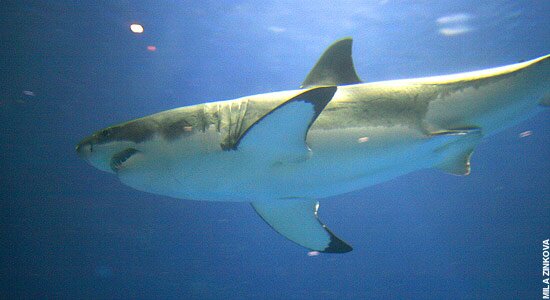
Great white shark: Many sharks are killed as fishing bycatch or for their valuable fins
Firstly – in the week of the International Whaling Commission meeting in Madeira, Portugal – whilst lots of countries get together to talk lots and try not to upset each other too much, the BBC reports that a highly-endangered species of porpoise is being pushed ever closer to extinction.
In a world panicking about recession and swine flu the conservation of this highly-endangered species is dropping off the priority list.
The Vaquita (the name means ‘little cow’ in Spanish) is one of the world’s smallest cetaceans (the family that includes whales, dolphins and porpoises) … and it gets much less air time than its bigger, more familiar cousins.
Yet it is really on the edge. It is the unwitting victim of bycatch in fisheries – something dolphin and porpoise lovers are all-too-familiar with in UK waters. And in late 2007 scientists warned that unless action was taken, the species could be extinct in just a few years.
But just in case you are rolling your eyes at the thought of Greenpeace being concerned about ‘cuddly’ porpoises – think on, as the news reports today are awash with dire warnings on more contentious oceanic animals too.
A new study shows that over a third of the world’s open ocean sharks are now threatened with extinction, including widely-recognisable species like hammerheads and great whites (There’s a nice photo gallery showing them off over on The Guardian website).
The major threat? Why, it’s destructive and unsustainable fishing practices – killing sharks as bycatch, and targeting them for their valuable fins. This of course is why we’ve been campaigning on tinned tuna – an industry which can have a dramatic impact on sharks, as well as turtles and other species.
Thankfully it is now quite easy to find pole-and-line caught tuna in the UK – caught using the most environmentally-friendly method - but the rest of the tuna industry still has a long way to go.
Sharks and porpoises are particularly vulnerable, being long lived, slow-growing animals. But they are also critters that people at least can recognise and express an interest in. If we can’t do right by those ones, what hope is there for the less charismatic inhabitants of our oceans
- Willie MacKenzie is part of Greenpeace’s Ocean Campaign. This blog post originally appeared on the Greenpeace UK website.

Following the success of the UK screenings on the 8th June and the film’s official cinema release, The Odeon, Panton Street, London, has confirmed that it is to show The End of the Line for a third consecutive week. Members of the film team will be doing Q&A sessions at some screenings.
Claire Lewis, Producer of the End of the Line and Willie MacKenzie, from Greenpeace’s Oceans Campaign, will be hosting a Q&A at Panton Street Odeon on Friday 26th June.
Claire, along with Rupert Murray, Director of The End of the Line, will be doing another Q&A at the Prince Charles Cinema, Leicester Place, off Leicester Square, London, on Sunday 28th June. Continue reading ‘Latest screening and Q&A details for The End of the Line’

The End of the Line has still been receiving plenty of coverage following its UK release and in the run up to its US launch. Here we bring together the latest news and a few older pieces that slipped through the net.
The Guardian covers the film and the issue of fish stocks again. In the Environment section, Felicity Lawrence, writes: ”The supermarkets have increased their targets for sustainable fish, and The End of the Line’s film release has prompted a flurry of announcements – most notably from M&S and Pret a Manger – to move even faster . . . .
“There is reason to hope that fish stocks can still recover, but we need to keep asking for sustainable catches. Keep the pressure up.” Continue reading ‘The End of the Line coverage following the film’s UK release’

I write this while looking out over the sea at Cape Cod realising that it is here along this coast that we humans have done the most damage to fish stocks.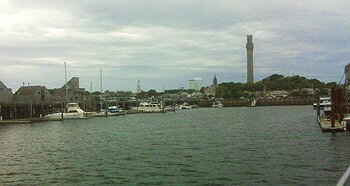
Cod is the history of this coast and its people. It is utterly beautiful here in Provincetown where The End of the Line is being screened as part of the their film festival.
Despite wind and rain - yes, like the UK - this is a community that was founded on fishing bounty. It now lives on tourism.
My co-speaker at the Q&A was Owen Nicols, a young man who was born and bred here in Provincetown. He is studying for a PHD in Fisheries Science and works at the local Oceans Institute.
Continue reading ‘Cape Cod - where humans have done the most damage to fish stocks’

The official cinema release of The End of the Line has led to further coverage of the film. Here we round up the latest reviews.
The Observer review of The End of the Line
Next time someone tells you there are plenty more fish in the sea, refer them to this alarming documentary. Jason Solomons, 14 June 2009.
The Telegraph review of The End of the Line
This new documentary starring former Telegraph environment editor Charles Clover is a powerful and troubling indictment of global fishing policies. 4/5 stars, Sukhdev Sandhu, 11 June 2009.
The Guardian review of The End of the Line
Doing something about [overfishing] means politicians imposing catch-limits or complete bans, and the consumer turning away from wastefully farmed fish and demanding sustainable stocks. Murray’s film is clear-sighted about the tough choices involved. 4/5 stars, Peter Bradshaw, 12 June 2009.
The Times review of The End of the Line
Rupert Murray’s forceful documentary The End of the Line should do for our oceans what An Inconvenient Truth did for climate change - that is, stamp the issue into the public consciousness and shame governments around the world into at least talking about doing something. 4/5 stars, Wendy Ide, 11 June 2009. Continue reading ‘The End of the Line film reviews’

A powerful new consortium has been formed to help protect threatened tuna in the Eastern Tropical Pacific.
The International Seafood Sustainability Foundation (ISSF), made up of conservation groups, scientist and tuna industry workers immediately demanded better protection of dwindling tuna stocks.
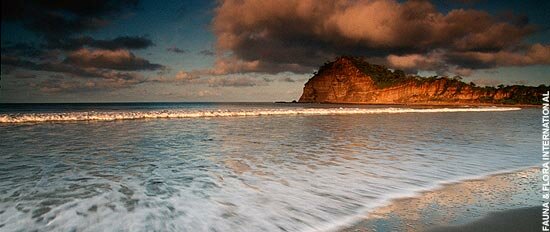
The International Seafood Sustainability Foundation, formed to protect threatened tuna in the Eastern Tropical Pacific, has attacked the Inter-American Tropical Tuna Commission ahead of their latest meeting
And they launched a scathing attack on the Inter-American Tropical Tuna Commission (IATTC) for ignoring scientific advice about overfishing and the damage being done to other species such as dolphins, turtles, sharks and seabirds.
The new pressure group claimed that IATTC, made up of 16 member countries with a mandate to regulate fishing fleets to avoid over-exploitation of tuna in the Eastern Pacific, had held six meetings in the past two years but had failed to take a single decision to help the threatened fish. Continue reading ‘New consortium aims to protect threatened tuna species’

Following the announcement by Pret a Manger chief, Julian Metcalfe, that he was taking tuna caught in unsustainable ways out of sandwiches and sushi, supermarket chain Marks and Spencer has claimed that it is switching to using pole and line caught tuna in its entire food range.

Greta Scacchi and her daughter Leila sitting with Alan Rickman, his wife Rima and Colin Firth at the aftershow party for The End of the Line
Both announcements follow screenings of the film, The End of the Line, based on a book by the environmental journalist, Charles Clover, which highlights the problems facing the largest tuna species, the bluefin. Continue reading ‘M&S bans unsustainable tuna after The End of the Line opens across the country’

The End of the Line film asks that consumers should choose only sustainable seafood - which means, first and foremost, that they agree to avoid eating actively endangered species, for example, the bluefin and bigeye tunas and the common skate.

Dear Chef / Restaurant Owner seafood response card
To help communicate this message to chefs and restaurant owners that we want to buy only sustainable seafood, we have drawn up a downloadable leaflet which can be printed easily on a single sheet of A4 so customers can let restaurants know what they think of the seafood on a restaurant’s menu after dining there.
Carry it with you when you go out to dinner.
The leaflet says: As a customer it is essential to me that you sell seafood that is not caught or farmed in ways that damage the ocean or its species.
It enables customers to rate the restaurant, by ticking one of the following options:
- I notice that some of the seafood you serve is caught or farmed in ways that is likely to harm the ocean and the wildlife in it
- Thank you for offering sustainable seafood. I look forward to recommending your business to my family and friends.
The card is then left after the meal, or with the bill.

The breeding population of bluefin tuna in the Eastern Atlantic and the Mediterranean has collapsed, in what may come to be seen as one of the world’s most spectacular ecological disasters, according to an independent report.
- The 2008 bluefin tuna dossier - Advanced Tuna Ranching Technologies [pdf of the full report by Roberto Mielgo]
The destruction of stocks of one of the world’s most expensive fish, already recognised as being as endangered as the giant panda, effectively took place in 2007, more than twice the legal catch was taken by Mediterranean fishermen under the eyes of EU and UN-recognised officials, according to the report.
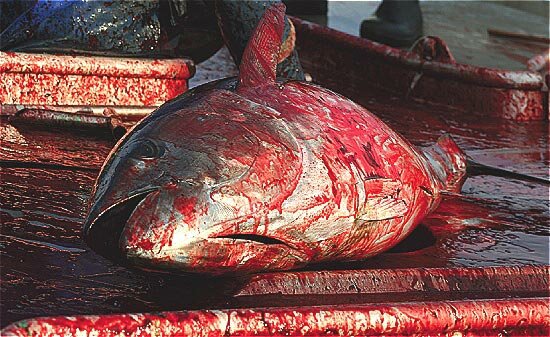
Bluefin tuna image from The 2008 bluefin tuna dossier by Advanced Tuna Ranching Technologies
If the analysis of the size and weight of tuna now passing through the Japanese market is representative of what remains in the sea, according to the report, the EU and other Atlantic nations have presided over disaster comparable to that of the collapse of the blue whale or the Northern cod.
Environmentalists blame the final destruction of what was the largest population of a fish which is known to have been hunted for 7,000 years on a catastrophic failure of governance by the EU and the International Commission for the Conservation of Atlantic Tunas (ICCAT).
Rampant illegal fishing with spotter aircraft, fast power-boats and the full modern hi-tech arsenal of fishing technology has hastened the decline.
A-list diners, including Charlize Theron, Sting and Elle Macpherson signed a letter of protest last week to Nobu Matsuhisa, the world-famous fushion chef, threatening to boycott his restaurants unless he takes the endangered bluefin tuna off the menu.
According to the latest report, released to coincide with World Oceans Day by the independent consultant Roberto Mielgo, 70 per cent of the bluefin tuna in the Japanese market between July 1 last year and May 1 this year were below 90 kilos in weight.
Some 33 per cent of the tunas on the Japanese market were below the legal size of 30 kg when caught – a major indictment of the inspection regime run by Mediterranean countries under the supervision of ICCAT.
Mr Mielgo said: “If this analysis of what is on the Japanese auction markets corresponds to what is left in the sea, we are in deep trouble. It means the adult bluefins are no longer there. If that is what is at sea, the stock will not recoup.
“My view is that the stock collapsed in 2007 as a result of the 2007 fishing season in which 61,000 tons of bluefin were caught. The fishery should have been closed in 2007.”
The 61,000 tons recorded in official catch figures in 2007 was twice the legal quota agreed by EU nations and ICCAT, four times what scientists advised was responsible and six times what ICCAT’s own scientists said was needed for the recovery of the stock.
Ten years ago, the majority of bluefin tuna in the Japanese market were medium-sized mature adults of 120 kgs or more and the stock structure wholly different to what it is now. Now a third of it is below the minimum landing size and causing concern even among Japanese tuna traders who dislike selling small fish.
Mr Mielgo’s report concludes: “The massive presence in the Japanese market of juvenile bluefin tunas having been illegally caught and farmed points to the failure of current control schemes, including the credibility of observers filling in caging declarations.”
Mr Mielgo is a tuna farmer turned whistle-blower. The report by his consultancy, Advanced Tuna Ranching Technologies, goes even further than trends presented earlier this year by WWF using official figures which showed that the population of breeding tuna in 2007 was only a quarter of that 50 years ago.
According to WWF’s analysis, the bluefin breeding population will disappear by 2012 under the current fishing regime. It called for the immediate closure of the fishery.
Mr Mielgo’s report says the age-profile of tunas on the Japanese market “is consistent with the hypothesis of an on-going collapse of the breeding population of this stock.”
He added: “It’s not that I am a pessimist. There is no way this population is going to pick up. Again, I hope I am wrong. The fish are not there.”
Dr Sergi Tudela, head of fisheries for the Mediterranean, said: “Our position in April, based on ICCAT data, is that the spawning stock will have been wiped out by 2012.
“This new data is a further indication of what we said then, which is that the spawners are disappearing. The reproducing stock is in serious trouble. This shows the bluefin is in dire straits.”
Mr Mielgo is featured in the film, The End of the Line, which has its national public premiere in 50 British cinemas tomorrow.

This week has seen a dramatic increase in the coverage for The End of the Line and related fishing issues in the run up to the World Ocean Day Screenings.
Many of the national daily papers have covered the film or the Nobu decision to continue selling bluefin tuna - a subject brought into the spotlight by The End of the Line campaign and Greenpeace.
In an extensive comment piece for The Independent, Johann Hari, asks whether we will be the generation that runs out of fish.
He writes: “In the babbling Babel of 24/7 news . . . the slow-motion stories that will define our age are often lost. An extraordinary documentary released next week, The End of the Line, forces us to stop, and see.”
The Telegraph reports that Sienna Miller, Charlize Theron, Jemima Khan, Woody Harrelson, Laura Bailey, Alicia Silverstone, Zac Goldsmith, Sting and his wife Trudie Styler have jointly written to Nobu asking him to remove bluefin tuna from the restaurant’s menus, so they can “dine with a clear conscience”.
The Sun also carries the story saying: “Sienna Miller blasted a top London restaurant for putting endangered bluefin tuna on its menu.” Continue reading ‘The End of the Line focuses spotlight on celebrity reaction to bluefin tuna on Nobu menu’

As we celebrate the first ever World Oceans Day, I find myself doing so with mixed emotions. Without a doubt it is time the oceans got the recognition they deserve - they are stunning, full of incredible diversity and immeasurable beauty.
- We need your help to protect Sierra Leone from illegal pirate fishing - Environmental Justice Foundation

In Sierra Leone 80 per cent of animal protein in the average diet comes from the ocean
As a child I grew up by the ocean, on the oceans, and whenever possible in the oceans, and they are a fundamental part of my life. I feel blessed that I get go to work every day and work to save the oceans.
There is no doubt that they need saving. It’s become very clear that the oceans, that for so long seemed so vast, are far from infinite.
We are putting them under incredible pressures, and the impacts of pollution, acidification and climate change are adding up fast.
It is now very clear that we are completely over-fishing our oceans, starkly demonstrated by The End of the Line.
That 80 per cent of global fish stocks are fully exploited or depleted, and the prediction that we’ll run out of fish by 2048, is pretty scary.
I realise that for many these figures seem far from home. Not for me. My job as an oceans campaigner has taken me all over the world to investigate illegal fishing, which is both a cause and effect of over-fishing.
I’ve seen the jagged holes left in coral reefs after they’ve been dynamited, and been appalled as a live shark had its fins cut off for the soup trade, and was then dumped over the side still desperately trying to swim. Continue reading ‘We must end overfishing to help developing countries that depend on oceans to survive’

The Science Museum turned out to be a very appropriate venue to host our special preview screening of The End of the Line on Monday night.
On a balmy summer evening well over 350 guests filled the spectacular IMAX cinema to see the film.
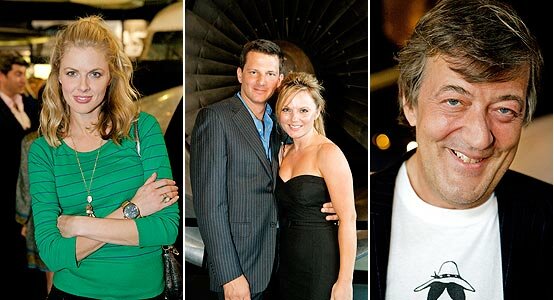
Donna Air, George Duffield, Producer of The End of the Line with Geri Halliwell, and Stephen Fry
After a reception surrounded by replicas of early planes, jet turbine engines and other flying machines a glittering array of people sat down.
Among the guests were Stephen Fry, Geri Halliwell, Donna Air and Sarah Brown, the Prime Minster’s wife. Continue reading ‘Stars turn out for The End of the Line screening at the Science Museum’

![]()










